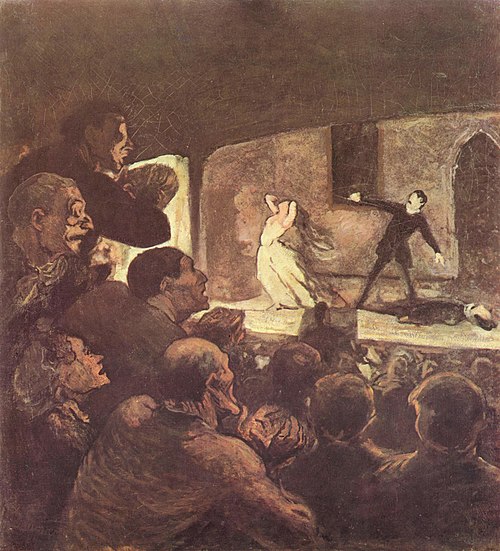Dramanoun
A composition, normally in prose, telling a story and intended to be represented by actors impersonating the characters and speaking the dialogue
Dramanoun
Such a work for television, radio or the cinema (usually one that is not a comedy)
Dramanoun
Theatrical plays in general
Dramanoun
A situation in real life that has the characteristics of such a theatrical play
Dramanoun
(slang) Rumor, lying or exaggerated reaction to life events; melodrama; an angry dispute or scene; intrigue or spiteful interpersonal maneuvering.
Dramanoun
A composition, in prose or poetry, accommodated to action, and intended to exhibit a picture of human life, or to depict a series of grave or humorous actions of more than ordinary interest, tending toward some striking result. It is commonly designed to be spoken and represented by actors on the stage.
Dramanoun
A series of real events invested with a dramatic unity and interest.
Dramanoun
Dramatic composition and the literature pertaining to or illustrating it; dramatic literature.
Dramanoun
a dramatic work intended for performance by actors on a stage;
Dramanoun
an episode that is turbulent or highly emotional
Dramanoun
the literary genre of works intended for the theater
Dramanoun
the quality of being arresting or highly emotional
Dramanoun
a play for theatre, radio, or television
Dramanoun
plays as a genre or style of literature
Dramanoun
the activity of acting
Dramanoun
an exciting, emotional, or unexpected event or circumstance
Drama
Drama is the specific mode of fiction represented in performance: a play, opera, mime, ballet, etc., performed in a theatre, or on radio or television. Considered as a genre of poetry in general, the dramatic mode has been contrasted with the epic and the lyrical modes ever since Aristotle's Poetics (c.
Melodramanoun
A kind of drama having a musical accompaniment to intensify the effect of certain scenes.
Melodramanoun
(countable) A drama abounding in romantic sentiment and agonizing situations, with a musical accompaniment only in parts which are especially thrilling or pathetic. In opera, a passage in which the orchestra plays a somewhat descriptive accompaniment, while the actor speaks
Melodramanoun
Any situation or action which is blown out of proportion.
Melodramanoun
Formerly, a kind of drama having a musical accompaniment to intensify the effect of certain scenes. Now, a drama abounding in romantic sentiment and agonizing situations, with a musical accompaniment only in parts which are especially thrilling or pathetic. In opera, a passage in which the orchestra plays a somewhat descriptive accompaniment, while the actor speaks; as, the melodrama in the gravedigging scene of Beethoven's "Fidelio".
Melodramanoun
an extravagant comedy in which action is more salient than characterization
Melodrama
In modern usage, a melodrama is a dramatic work wherein the plot, which is typically sensational and designed to appeal strongly to the emotions, takes precedence over detailed characterization. Melodramas typically concentrate on dialogue, which is often bombastic or excessively sentimental, rather than action.










